 | Thomas Curtis (of Grove house sch, Islington) - 826 pages
...contended not for the gift, but for the honour. Id. Heat it a very brisk agitation of the insensible part* of the object, which produces in us that sensation from whence we denominate the object hot ; so what in our sensation is heat, in the object is nothing but morion. Locke. Hops lying undried heati... | |
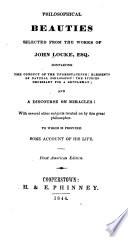 | John Locke - 1844 - 272 pages
...the great instrument of nature, that she makes use of in most, if not all, her productions. Heat is a very brisk agitation of the insensible parts of...sensation, from whence we denominate the object hot ; so what in our sensation is heat, in the object is nothing but motion. This appears by the way whereby... | |
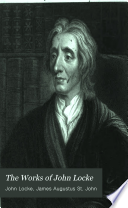 | John Locke, James Augustus St. John - 1854 - 576 pages
...the great instrument of nature, that she makes use of in most, if not all, her productions. Heat is a very brisk agitation of the insensible parts of...sensation from whence we denominate the object hot ; so what in our sensation is heat, in the object is nothing but motion. This appears by the way whereby... | |
 | Joseph Jones - 1859 - 444 pages
...the Interpretation of Nature, by Francis Lord Verulam. London, William Pickering, 1850. 2 " Heat is a very brisk agitation of the insensible parts of...sensation, from whence we denominate the object hot ; so what in our own sensation is heat, in the object is nothing but motion." — JOHN LOCKE. 3 The first... | |
 | American Medical Association - 1859 - 740 pages
...the Interpretation of Nature, by Francis Lord Verulam. London, William Pickering, 1850. 3 " Heat is a very brisk agitation of the insensible parts of...sensation, from whence we denominate the object hot ; so what in our own sensation is heat, in the object is nothing but motion." — JOHN LOCKE. ' The first... | |
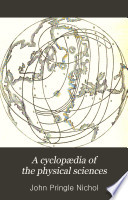 | John Pringle Nichol - 1860 - 942 pages
...have passed since Locke gave a definition of heat, which he probably derived from Bacon. — " Heat is a very brisk agitation of the insensible parts of...sensation from whence we denominate the object hot ; so what in our sensation is heat, in the object is nothing but motion." If we add Newton's definition... | |
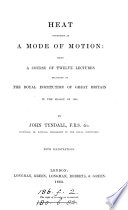 | John Tyndall - 1863 - 538 pages
...view of this kind,* and Locke stated a similar view with singular felicity. ' Heat,' he says, ' is a very brisk agitation of the insensible parts of the object, which produce in us that sensation from whence we denominate the object hot : so what in our sensation is... | |
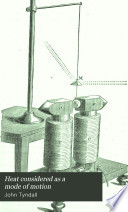 | John Tyndall - 1863 - 500 pages
...view of this kind,* and Locke stated a similar view with singular felicity. ' Heat ' he says, ' is a very brisk agitation of the insensible parts of the object, which produce in us that sensation from whence we denominate the object hot ; so what in our sensation is... | |
 | John Tyndall - 1864 - 484 pages
...numerous contributors to that great step in physical science. Two centuries ago, Locke said that ' Heat is a very brisk agitation of the insensible parts "of...the object hot ; so that what in our sensation is Tieat, in the object is nothing but motion? In 1798, Eumford, inquiring into the source of heat developed... | |
 | John Addison Porter - 1864 - 664 pages
...Eacon long ago suggested that " it is in its essence motion and nothing else." Locke defined it as " a very brisk agitation of the insensible parts of...sensation from whence we denominate the object hot." Davy subsequently supported the same view by conclusive experiments. It has since been most ably sustained... | |
| |